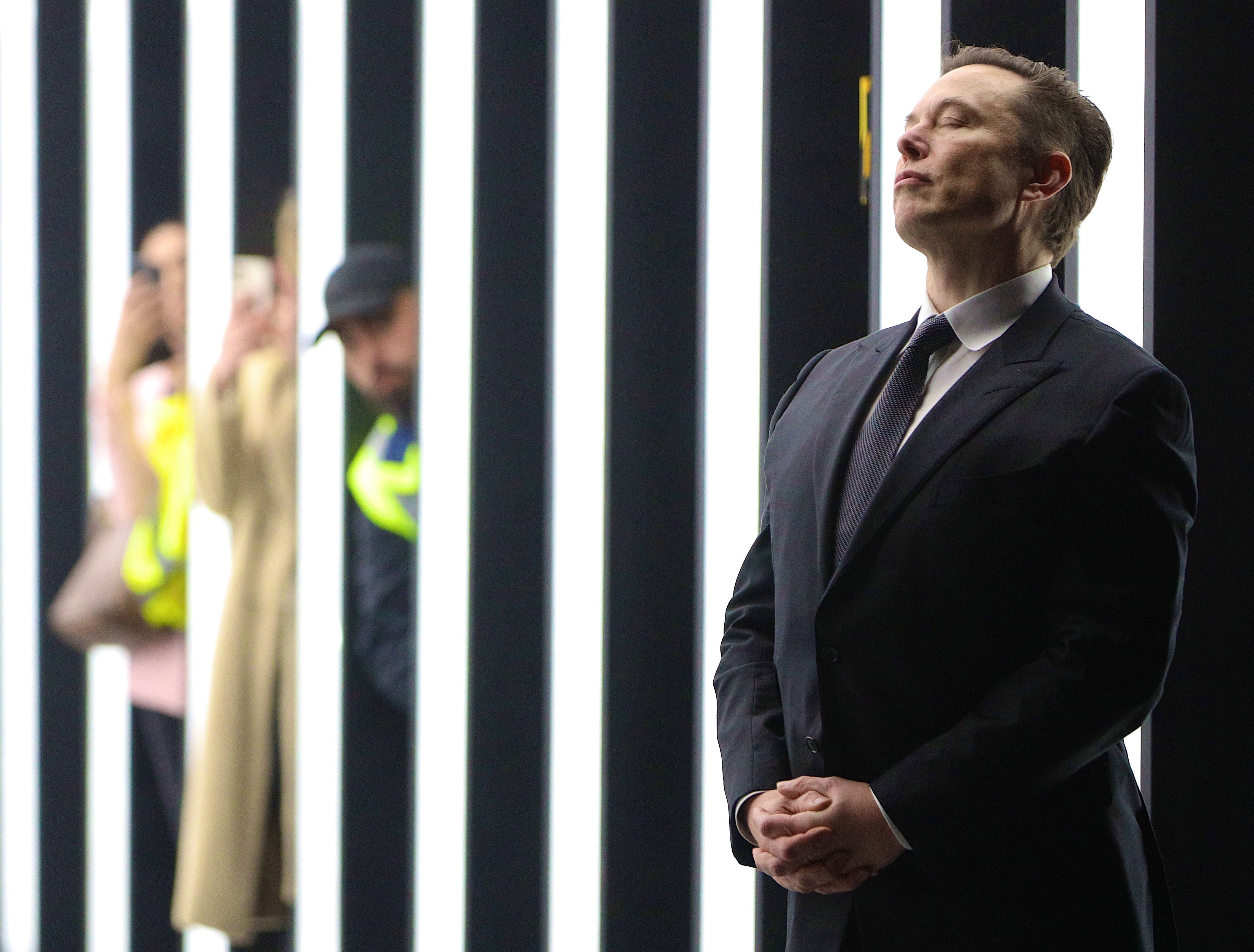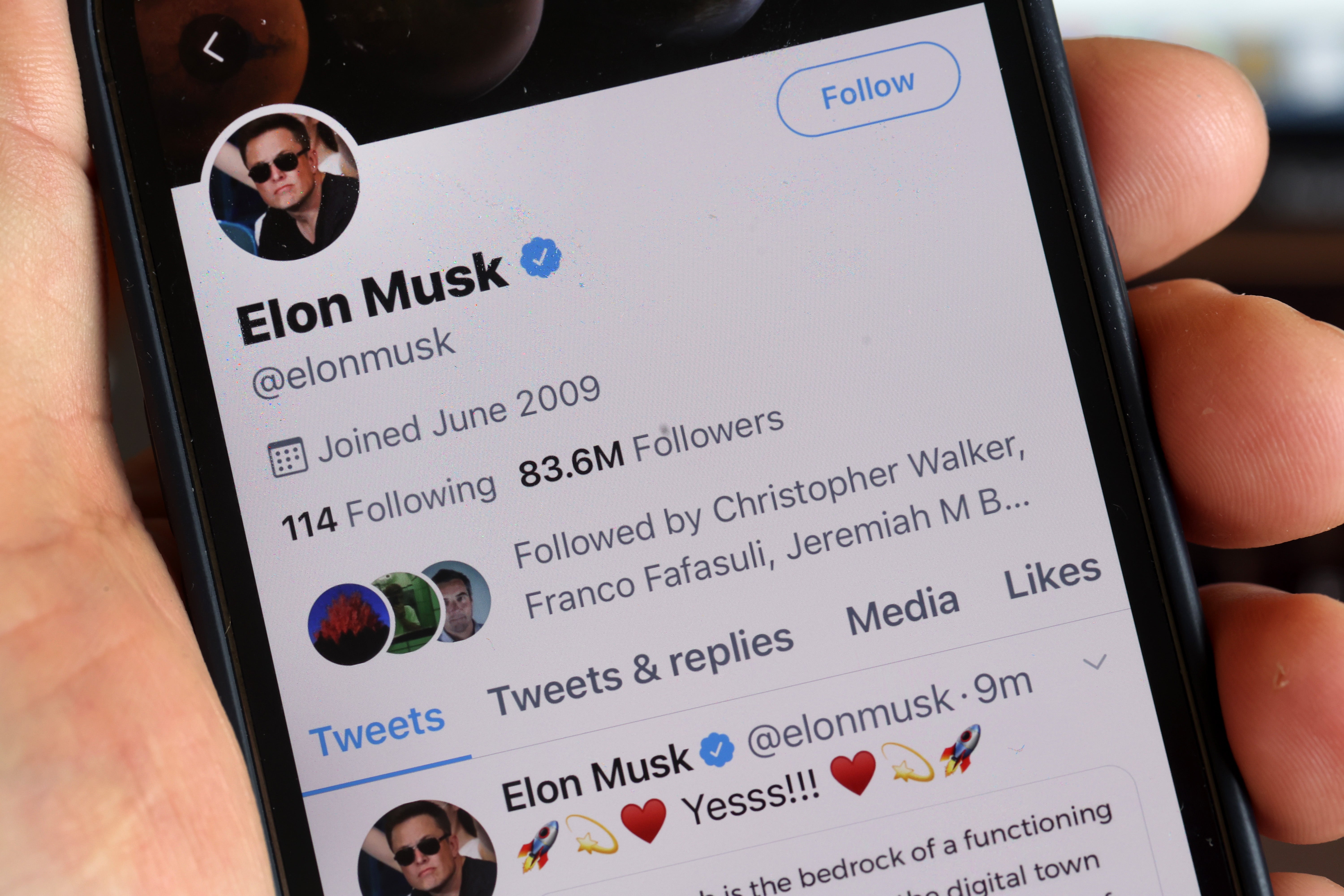Will the real Elon Musk please stand up?
Man who taught himself computing at age of 10 may now sit at unprecedented nexus of power and influence, writes Andrew Buncombe


So, who precisely is Elon Musk?
Is he the brilliant tech wizard who taught himself computing skills at the age of 10 with the help of a decidedly basic Commodore home computer? Is he the visionary with sharp elbows who got in early at Tesla and seized control, before transforming the way the world thought about electric vehicles?
Is he the doting family man with seven intriguingly-named children. Or is he the shock-jock blowhard who smokes weed while chatting to Joe Rogan, gets taken to court for making wild allegations that someone is “a pedo guy”, and is charged by the federal financial watchdog for loose words about taking Tesla private, a $40m penalty he later tweeted was “worth it”?
Or is he now, as he has claimed, the champion of free speech, who has bought Twitter for $44bn with a vow to make it more open, and possibly lift the ban on Donald Trump, banished 15 months ago after repeatedly posting false claims about the 2020 election being rigged.
We know that the 50-year-old, who was born in South Africa, is also now the world’s richest person and said to be worth $279bn, according to Forbes, but that is the easy bit.
As the dust settles from the shock and noise that came with Musk’s purchase, it may emerge that Musk is all of these and more. (Don’t forget he is also the founder, CEO, and Chief Engineer at SpaceX, one of the private firms trying to make possible the colonisation of Mars.)
It may be that he sits at a nexus that makes him one of the most influential and powerful people on the planet, and certainly in the United States, and that his actions over the coming weeks, months and years will come to increasingly impact all of us.
“The closest comparison to this might be the 19th-century newspaper barons like William Randolph Hearst, Joseph Pulitzer and the fictional Charles Foster Kane, who used their papers to pursue their personal agendas, sensationalise world events and harass their enemies,” wroteNew York Times technology columnist Shira Ovide.
“We have not really had a Citizen Kane of the digital age, but Musk might be it. And Twitter’s global influence is arguably larger and more powerful than that of any Hearst newspaper of its day.”
The latest headlines about Musk have been about his purchase of Twitter, and his plans to give it a major overhaul. Twitter initially announced that Musk would buy less than 10 per cent of its stock and take up a position on the board.
That news came as Musk, who has more than 80 million followers on Twitter, had repeatedly critiqued and criticised the platform. For one thing, he said, it badly needed an edit button.

Yet, his views went beyond the actual features of the platform.
“Free speech is essential to a functioning democracy,” he tweeted in March.
“Do you believe Twitter rigorously adheres to this principle?”
Perhaps using language more diplomatic than many of Twitter’s users, CEO Parag Agrawal, who dealt with Musk about the purchase and will stay on in his role for the immediate future, said of the man who’d soon become the new owner: “He’s both a passionate believer and intense critic of the service which is exactly what we need.”
Twitter founder Jack Dorsey said: “Elon’s goal of creating a platform that is ‘maximally trusted and broadly inclusive’ is the right one.”
He added: “I’m so happy Twitter will continue to serve the public conversation. Around the world, and into the stars.”
In a statement released when the deal was announced that he would be paying $54.20 per share, a 38 per cent premium over its current stock price, Musk said that free speech was “the bedrock of a functioning democracy, and Twitter is the digital town square where matters vital to the future of humanity are debated”.
He added: “I also want to make Twitter better than ever by enhancing the product with new features, making the algorithms open source to increase trust, defeating the spam bots, and authenticating all humans.”
For several decades now, Elon Reeve Musk has become used to being a newsmaker and winning himself headlines. Having moved to Canada from South Africa with his mother when he was a teenager, he studied at the University of Pennsylvania and planned to attend Stanford University.
Instead, he and his brother, Kimbal – Musk also has a sister, Tosca – began a tech start-up Zip2. A few years later, the business was bought by Compaq for more than $300m.
Musk’s pay-out of $22m helped him establish an early online banking system, that would later become merged with PayPal. PayPal was bought by eBay and Musk would receive a payout of more than $175m.
At around the same time, he began a space exploration firm, SpaceX, established with the desire of expanding access to the solar system, and potentially helping enable the colonisation of Mars. In 2004, he became an early investor in Tesla, which had been started by entrepreneurs Martin Eberhard and Marc Tarpenning. Musk later took control of the company, which these days is said to be worth US $1 trillion.

Musk has also talked of building a high-speed rail link, a hyperloop, between Los Angeles and San Francisco, set up a drilling firm, The Boring Company, to construct tunnels, and co-founded Neuralink, a neurotechnology startup that seeks to connect the human brain with artificial intelligence. Musk said the technology could help treat paralysis and deafness, but many experts were doubtful.
Musk, who has been married and divorced twice, has a total of seven children. Justine Musk, nee Wilson, a Canadian writer who Musk married in 2000, had their first child, Nevada, in 2002, but the baby boy died of sudden infant death syndrome, or SIDS, at 10 weeks.
In April 2004, the couple had twin sons Griffin and Xavier Musk, who are now both aged 17. In 2006, the couple had triplet sons – Kai, Saxon and Damian.
Musk and Wilson divorced in 2008. He would later marry and divorce, the British actor Talulah Riley, whose films include Pride and Prejudice.
More recently, Musk has had two more children with Claire Elise Boucher, a Canadian singer, who uses the professional name Grimes – a little girl they named Exa Dark Sideræl Musk, and a boy, named X Æ A-Xii.
They call the little son X , while Grimes told Vanity Fair, the little girl’s name is pronounced “sigh-deer-ee-el”.
Musk, whose parents divorced when he was aged just nine, has described himself as a “free speech absolutist”.
As the prospect of the multi-billionaire buying Twitter appeared more and more likely, some commentators drew attention to some of the times when Musk may have gone too far.
In October 2018, he found himself in hot water after the federal Securities and Exchange Commission (SEC) charged him with misleading investors with tweets in August of that year that said he was thinking about taking Tesla private at $420 and that he had funding to do so. In truth, he had no funding and the chaos that ensued hurt some investors.
That year, Musk settled with the SEC, agreeing to step aside as chairman and paying two fines of $20m each. He did not appear upset by the settlement, and promptly tweeted: “Worth it.”
Of more concern to some observers was another occasion in which Musk misused Twitter, and triggered a backlash that ended in a lawsuit.
In the summer of 2018, Musk baselessly called a British cave diver who was trying to help save 12 trapped Thai children, a “pedo guy”. He did so after the diver, Vern Unsworth, told CNN that Musk’s offer to send a submarine to try and save the children was “a PR stunt”.
“It just had absolutely no chance of working,” said Unsworth.
“He had no conception of what the cave passage was like. The submarine, I believe, was about 5ft 6in long, rigid, so it wouldn’t have gone round corners or round any obstacles.”
Unsworth, who is credited as having led the rescue operation that saved the children, sued Musk for defamation. His lawyer told the court that by making such an assertion, one that was read by his millions of followers, was light dropping a “nuclear bomb” on him.
Musk and his lawyers argued that the phrase “Pedo guy” was just heated rhetoric and was not meant as a statement of fact.
Musk apologised to Unsworth and the jury decided in his favour.
Musk had testified in his own defence and retuned to court as the verdict was delivered.
As he left, he said: “My faith in humanity is restored.”
Join our commenting forum
Join thought-provoking conversations, follow other Independent readers and see their replies
Comments
Bookmark popover
Removed from bookmarks